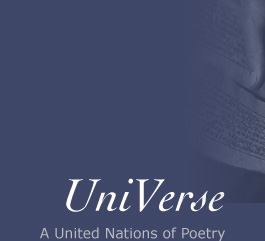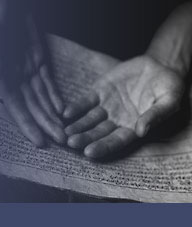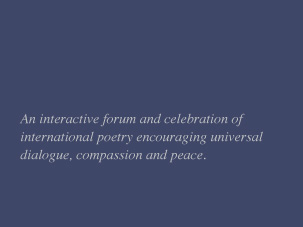| |
 |
 |
 |
Agi Mishol The author of more than a dozen books of poetry, Agi Mishol was born in Transylvania (Romania) in 1947 to Holocaust survivor parents of Hungarian descent, and came to Israel in 1950. She has an MA in Hebrew literature from the Hebrew University of Jerusalem. Currently poet-in-residence at the Hebrew University of Jerusalem, she teaches literature at Alma College, and has taught at Ben Gurion and Tel Aviv universities as well. She writes literary reviews for the print media and translates poetry and esoteric literature. Mishol served as artistic co- director of the 2006 International Poetry Festival at Mishkenot Sha`ananim, Jerusalem, and is active on the editorial board of the poetry journal, Helicon.On her farm in Kfar Mordechay, near Gedera, she grows peach, persimmon and pecan trees. Mishol has received numerous awards, including the Tel Aviv Foundation Award (1991), the first Yehuda Amichai Poetry Prize (2002), the Prime Minister`s Prize, and the Dolitzky Prize for Poetry (20
07). A guest of many international poetry festivals, Mishol will appear at Stanford, UCLA Berkeley and in San Francisco February 5-7, 2008. A volume of her poems in English translation, Look There was published by Graywolf Press in 2006; a book in French translation is forthcoming.
Lisa Katz was born in New York and studied at the University of Michigan and the City College of New York, receiving a PhD (on the poetry of Sylvia Plath) from the English Department of the Hebrew University in Jerusalem, where she has lived since 1983. Reconstruction, a volume of her poetry in Hebrew translation, is forthcoming from Am Oved in Israel ; her poetry appears most recently in the US in Hunger Mountain, Zeek, Prairie Schooner and Mississipi Review. Three times nominated for a Pushcart Prize, her work is featured in Illness in the Academy, ed. Kimberly Myers, Purdue University Press, 2007. Look There: The Selected Poems of Agi Mishol in Katz's translation was published in January 2006 as a Lannan Foundation translation selection of Graywolf Press. She teaches literary translation and creative writing at Hebrew University.
|
 |
 |
Hebrew
version

|
English
version
The Transmigration of Souls
It's hard for you to believe in reincarnation
but you're willing to try,
considering the alternative.
If only someone would explain
where the souls are, in a city or a town
or a kind of campground,
and how much one can count on a soul
whose entire existence is based on rumor.
I am reading to you from the Tibetan Book of the Dead
about the soul's journey to city or town
or that campground,
how it rises out of the body like a dove.
The Tibetans make you laugh
but never mind.
What interests you is the exact moment when everything ends,
how from this one moment to the next
blood and heart freeze within the body
and everything else goes on as if nothing had happened.
My darling,
you are almost 90 and know
how to distinguish between death and the fear of death.
When you fall asleep in your armchair
a breeze flutters the pages of your book
and puffs onward.
Even you can see a bird,
forget about yourself
and become its flight.
And the pine cone I saw outside,
hard wooden fist,
will relax in the end, and release
seeds to the earth.
What happens later doesn’t interest you,
whether to be buried or burned,
it's not your problem,
and yet I see from your foreshortened perspective
you re beginning to paint a new horizon
even if it is Tibet
just for a laugh
and I'm simply holding
the palette.
Translated from the Hebrew by Lisa Katz |
 |
 |
Hebrew
version
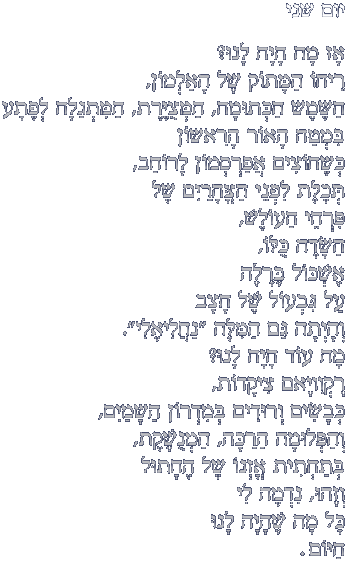
|
English
version
Monday
So what did we have?
The sweet scent of jasmine,
the painted orange sun
discovered suddenly
while cutting the persimmon in half
at the first volley of light.
The chicory flowers’
morning blue,
the entire meadow,
a cluster of snails
on top of a sea onion stalk
and there was also the word “wagtail.”
What else was there?
The cicada requiem,
pink sheep in the sloping sky,
and the soft, much-kissed down
on the bottom of the cat’s ear
and that’s it, I think
that’s what we had
today.
Translated from the Hebrew by Lisa Katz, Look There (Graywolf Press 2006) |
Hebrew
version
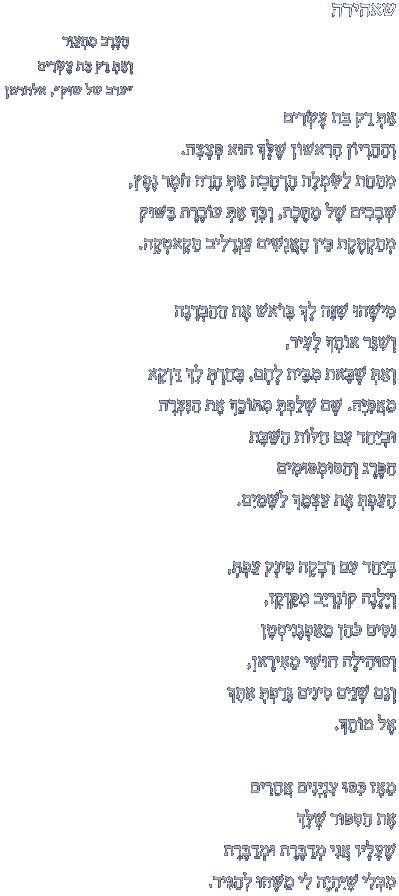
|
English
version
Woman Martyr
“The evening goes blind, and you are
Only twenty”
Nathan Alterman Late Afternoon in
the Market
You are only twenty
and your first pregnancy is a bomb.
Under your broad skirt you are pregnant with dynamite
and metal shavings. This is how you walk in the market,
ticking among the people, you, Andaleeb Takatka.
Someone loosened the screws in your head
and launched you toward the city;
even though you come from Bethlehem,
the Home of Bread, you chose a bakery.
And there you pulled the trigger out of yourself,
and together with the Sabbath loaves,
sesame and poppy seed,
you flung yourself into the sky.
Together with Rebecca Fink you flew up
with Yelena Konre’ev from the Caucasus
and Nissim Cohen from Afghanistan
and Suhila Houshy from Iran
and two Chinese you swept along
to death.
Since then, other matters
have obscured your story,
about which I speak all the time
without having anything to say.
Translated from the Hebrew by Lisa Katz, Look There (Graywolf Press 2006) |
 |
 |
Patron: Linda
Feldman |
 |
|
